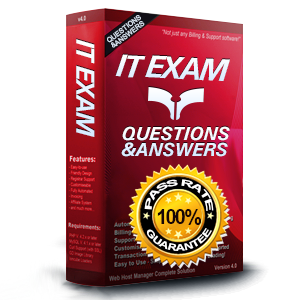
JN0-541 Exam Questions & Answers
Exam Code: JN0-541
Exam Name: IDP, Associate(JNCIA-IDP)
Updated: Nov 25, 2024
Q&As: 120
At Passcerty.com, we pride ourselves on the comprehensive nature of our JN0-541 exam dumps, designed meticulously to encompass all key topics and nuances you might encounter during the real examination. Regular updates are a cornerstone of our service, ensuring that our dedicated users always have their hands on the most recent and relevant Q&A dumps. Behind every meticulously curated question and answer lies the hard work of our seasoned team of experts, who bring years of experience and knowledge into crafting these premium materials. And while we are invested in offering top-notch content, we also believe in empowering our community. As a token of our commitment to your success, we're delighted to offer a substantial portion of our resources for free practice. We invite you to make the most of the following content, and wish you every success in your endeavors.

Download Free Juniper JN0-541 Demo
Experience Passcerty.com exam material in PDF version.
Simply submit your e-mail address below to get started with our PDF real exam demo of your Juniper JN0-541 exam.
![]() Instant download
Instant download
![]() Latest update demo according to real exam
Latest update demo according to real exam
* Our demo shows only a few questions from your selected exam for evaluating purposes
Free Juniper JN0-541 Dumps
Practice These Free Questions and Answers to Pass the JNCIA Exam
What is one use of an IP action?
A. It modifies the IP header to prevent the attack.
B. It blocks subsequent connections from specific IP addresses.
C. It permits or denies the traffic, based on the IP header.
D. It modifies the IP header to redirect the attack.
Which two statements are true? (Choose two.)
A. If the source IP, target IP, and service in a packet match a particular IDP rule, the rule's action will be performed.
B. All of the rules in the IDPrulebase are examined until either the end of the list is reached, or a matching rule has the Terminate Match button checked.
C. One packet can match on multiple IDP rules.
D. Once the IDP sensor stops comparing a packet against the list of IDP rules, it performs only the first action in the matching rules.
Which OSI layer(s) of a packet does the IDP sensor examine?
A. layers 4-7
B. layers 2-7
C. layers 2-4
D. layer 7 only
What is a Violation Object in ESP?
A. any object that defines configuration of ESP
B. any object that violates application context in ESP
C. any object that violates the Security Policy configured in ESP
D. any object that defines valid network connections on the network
Which three actions can be taken on a rule when deployed in inline mode? (Choose three.)
A. drop connection
B. drop stream
C. drop packet
D. close server and client
Viewing Page 1 of 3 pages. Download PDF or Software version with 120 questions

